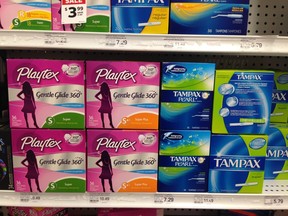
Article content
Equitable access to menstrual products and education about reproductive health is an essential part of health care.
Yet, period poverty — the lack of access to menstrual products — continues to enforce gender barriers in our province.
Article content
Financial limitations and patriarchal social norms mean that many people who menstruate do not have access to affordable products, waste management, or essential education. And the culture of shame surrounding menstruation is also a significant barrier preventing women and young girls from exercising their sexual and reproductive rights.
Advertisement 2
Article content
Recent statistics related to period poverty are disheartening. A 2023 survey by the Alberta Women’s Health Foundation (AWHF) found that cultural taboos, including those surrounding menstruation, have direct and harmful effects on a woman’s ability to access health care.
The survey also identified painful periods as a key challenge affecting their lives and as girls grow into women, many will need to sacrifice income or risk job loss for taking unpaid, informal menstrual leave. Eighty-six per cent of women who experience painful periods found that menstrual pain directly affected their work life.
There has been some movement in recent years to address period poverty, with the cities of Edmonton and Calgary providing free menstrual products in city buildings, beginning in 2021. Calgary expanded this program in 2023 to include all library facilities. And the Edmonton Catholic School Division announced in 2022 that it would provide free menstrual products available in all washrooms.
Although these are great steps forward, we are a long way from realizing menstrual equity in Alberta, especially in smaller cities and rural communities.
Article content
Advertisement 3
Article content
We need to leverage this momentum towards menstrual equity and establish proactive, gender-transformative policies at the provincial level to set up women and girls for success.
The provincial government must step up and, at the very least, provide free period products in all provincial workplaces and provincial buildings.
Alberta is in the midst of the worst affordability crisis in memory. The UCP has the ability to ensure Albertans’ most basic needs, like access to menstrual products, are being met. However, the UCP has failed to act, leaving this task up to community lead initiatives.
The success of the recent Period Poverty Drive, organized by the Calgary-Edgemont constituency office, shows how generous our community is and resulted in making the Period Poverty Drive a permanent, ongoing endeavour. Supplies can be dropped off at the Calgary-Edgemont constituency office at 202, 1829 Ranchlands Boulevard, NW.
Access to period products is a basic necessity and should not be considered a luxury. International Women’s Day is an opportunity to ask ourselves what kind of world we want to create for women and girls.
Advertisement 4
Article content
It is not enough to celebrate how far gender equity has come. We must continue to advocate for sexual and reproductive justice for all Albertans. Eliminating the stigmas around menstruation and ensuring that everyone has equitable access to menstrual products will ensure a more equitable future for the menstruating population of Alberta.
Julia Hayter, @NDPJulia, is the Alberta NDP official Opposition critic for the Status of Women and the MLA for Calgary-Edgemont.
Ziyana Kotadia, @ziyanakotadia, is a Calgarian gender justice advocate and graduate student in gender studies at the University of Cambridge.
Article content



